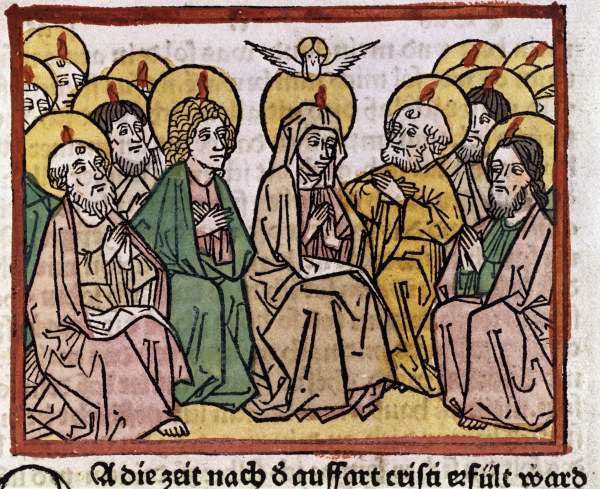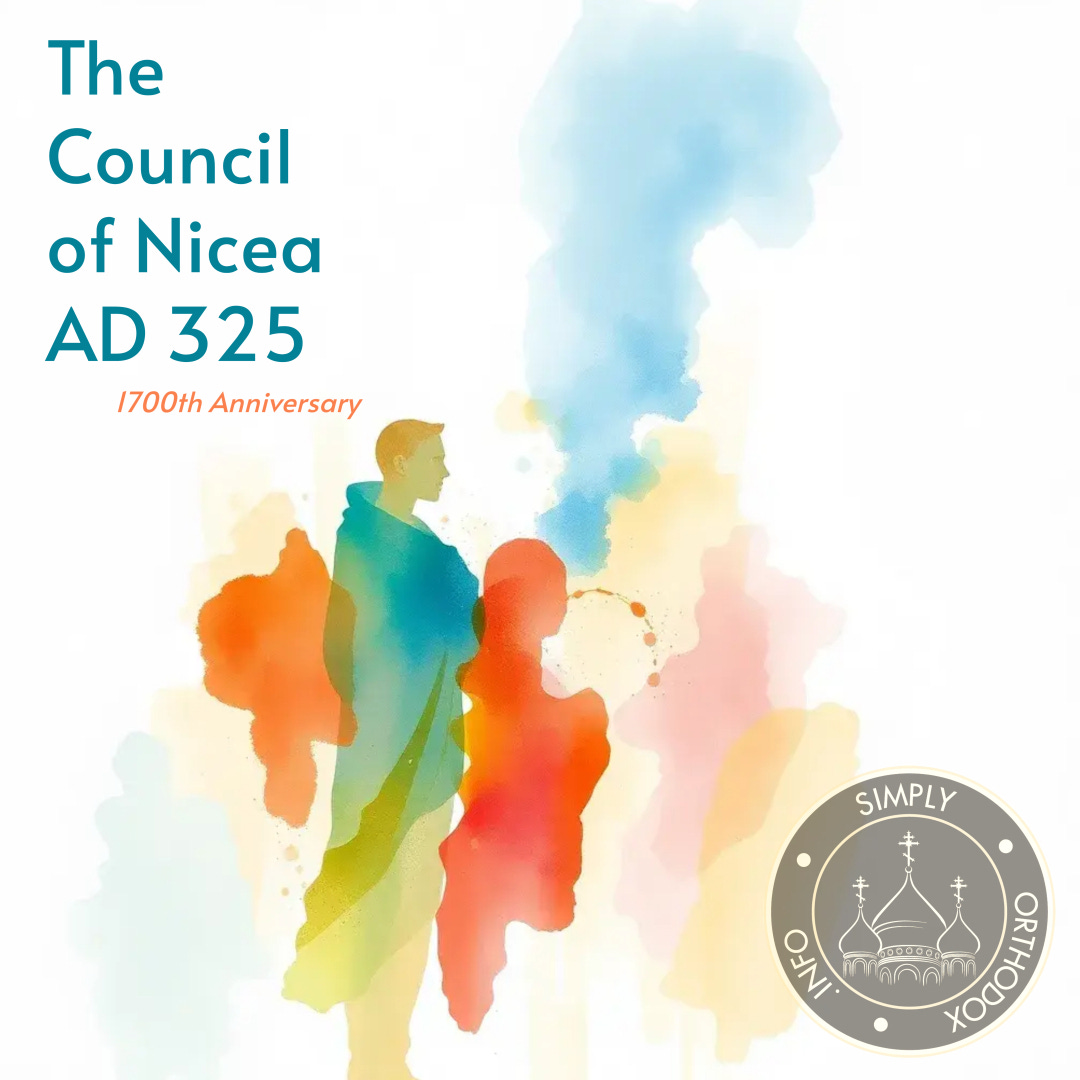The Spirit, the Church, and the Hope of Glory: Completing the Nicene Creed
The Nicene Creed's teaching on the Holy Spirit, the Church’s mission, and our confident wait for Christ’s return
The following is based on a class presentation at Saint Mark Greek Orthodox Church in Boca Raton, Florida. The article has been adapted from an in-person class—the video is included below, along with a PDF download of the slideshow.
This is the final installment of a five part series on the Creed; you can also view the first, second, third, or fourth article in the series.
We are sharing the material in the order it was presented locally at our parish.
Introduction
The Nicene Creed ends with a vision of the future so compelling that it can shape a lifetime: the hope of eternal life, where tears are wiped away, and death is no more. But how do we live toward that hope today? To answer this, the Creed calls us to look at the present—at the ongoing work of the Holy Spirit, the community of faith known as the Church, and the sacraments through which God transforms us. These are not lofty ideas lost in abstraction; they are the means by which God renews us here and now, preparing us for the glory to come.
These final mysteries of the Nicene Creed call us beyond what we can see into the very heart of God’s plan for humanity. The Creed teaches us of the role of the Holy Spirit’s presence, the Church’s mission, and the eternal life promised through Christ. This article takes us through the Spirit's transformative work, the unity and holiness of the Church, and the hope that no shadow of death can overcome.
The Holy Spirit: Lord and Giver of Life
The Creed declares our faith “in the Holy Spirit, the Lord, the Giver of Life, who proceeds from the Father, who with the Father and the Son together is worshipped and glorified, who spoke by the prophets.” Here the creed affirms that the Holy Spirit is not a mere force, but the Lord Himself—divine, and co-equal with the Father and the Son. As Jesus teaches, “God is Spirit, and those who worship Him must worship in spirit and truth” (John 4:24), pointing directly to the Spirit's divine nature.
The Creed’s precision that the Holy Spirit “proceeds from the Father” is drawn from Christ's own words in John 15:26: “When the Helper comes, whom I shall send to you from the Father, the Spirit of truth who proceeds from the Father, He will testify of Me.” This eternal procession highlights the Spirit's intimate bond with the Father, while His sending by the Son reveals the harmonious work of the Trinity. Because He is fully God, we worship and glorify Him alongside the Father and Son. It was this same Spirit who inspired the prophets of old, as 2 Peter 1:21 confirms: “Prophecy never came by the will of man, but holy men of God spoke as they were moved by the Holy Spirit.”
As the "Giver of Life," the Spirit descended upon the apostles at Pentecost, empowering them to carry the Gospel to the world (Acts 2:4). This is the fulfillment of Christ's promise: “I will pray the Father, and He will give you another Helper, that He may abide with you forever” (John 14:16). This abiding presence transforms believers, breathing divine life into our worship and mission.

What the… Filioque?
The word Filioque (“and the Son” in Latin) refers to a phrase added to the Nicene Creed in the Western Church, so that it reads, “the Holy Spirit… who proceeds from the Father and the Son.”
The Orthodox Church does not accept this addition.
Why not? From an Orthodox perspective, the Creed is a universal statement of faith, formulated by the first two Ecumenical Councils with direct reference to John 15:26, where Jesus says the Spirit “proceeds from the Father.” The Orthodox believe altering this foundational confession, especially without a council representing the whole Church, disrupts the unity and original intent of the Creed.
First Council of Nicaea (AD 325): The initial Nicene Creed was drafted to affirm the divinity of Christ and counter the Arian heresy.
First Council of Constantinople (AD 381): This council expanded and completed the Nicene Creed, particularly the section on the Holy Spirit, resulting in the Nicene-Constantinopolitan Creed that is universally recited in the Orthodox Church today.
Council of Ephesus (AD 431): This council forbade the creation of any new creeds in addition to the Nicene Creed.
Council of Chalcedon (AD 451 ): The definitive declaration against changing the creed was made here. Bishops at the council reaffirmed and accepted the AD 381 version of the creed as an authentic interpretation of the faith of Nicaea and declared it “inviolable.”
Fourth Council of Constantinople (AD 879–880) condemned any unauthorized alterations to the Nicene Creed, specifically the addition of the Filioque, affirming the original text and declaring that such changes were illegitimate and heretical—an action central to the doctrinal divide between Eastern Orthodoxy and Western Christianity. This council is often considered the Eighth Ecumenical Council in the Orthodox Church.
As the Council put it: “If anyone shall falsify this sacred Creed by inserting illegitimate words, or additions, or subtractions, let him be anathematized by the holy and ecumenical synods already assembled.”
Theologically, the Orthodox Church teaches that the Holy Spirit’s eternal origin is uniquely from the Father. By adding “and the Son” blurs the distinct roles of the Trinity and risks misunderstanding the mystery of how the three divine Persons relate. For these reasons—doctrinal and historical—the Orthodox continue to confess the original wording: “The Holy Spirit… who proceeds from the Father.”
The One, Holy, Catholic, and Apostolic Church
Next, the Creed grounds our faith in the community God established: “In one, holy, catholic, and apostolic Church.” The Church is the living vessel where we encounter God’s revelation through the power of the Holy Spirit. It is, as Ephesians 2:19-20 describes, “the household of God, having been built on the foundation of the apostles and prophets, Jesus Christ Himself being the chief cornerstone.”
The Church is one because it is mystically united across the globe by the Holy Spirit. Despite human failings and divisions, this spiritual unity is expressed through a shared faith and Eucharistic communion. “There is one body and one Spirit,” the Apostle Paul writes, “one Lord, one faith, one baptism” (Ephesians 4:4-5).
The Church is holy because it is set apart for God’s purposes. It is the Body of Christ, called to reflect His purity. This call extends to every member, as 1 Peter 1:15-16 exhorts: “As He who called you is holy, you also be holy in all your conduct.”
The term catholic means “whole” or “complete.” It signifies that the Church contains the fullness of God’s truth and is universal, embracing all people across all time. As Romans 10:12 affirms, “There is no distinction between Jew and Greek, for the same Lord over all is rich to all who call upon Him.”
The Church is apostolic because it is built upon the foundation of the apostles chosen by Christ. The Orthodox Church traces its faith, mission, and spiritual authority in an unbroken line back to them, steadfastly holding to "the apostles’ doctrine and fellowship, in the breaking of bread, and in prayers” (Acts 2:42).
Becoming Part of the Church: Baptism and Chrismation
We enter this community through baptism, as the Creed confesses: “I acknowledge one baptism for the remission of sins.” This sacrament is the doorway to the Christian life, uniting us with Christ’s death and resurrection. As Romans 6:4 explains, “We were buried with Him through baptism into death, that just as Christ was raised from the dead... we also should walk in newness of life.” When we are baptized in the name of the Father, Son, and Holy Spirit, our sins are washed away, and we are reborn as children of God.
Immediately following baptism, the Orthodox Church completes baptism by bestowing the mystery of Chrismation, sealing the believer with the gift of the Holy Spirit. This anointing fulfills the practice described in Acts 8:17: “They laid hands on them, and they received the Holy Spirit.” Sustained by these sacraments, we live in fellowship with God, participating in the very life of Christ’s body and blood.
Living as Christians Until Christ Returns
As members of Christ's Church, our lives are reoriented toward a new purpose: to live faithfully before God until His return. This is a life of belief and action, marked by prayer, obedience, and sharing the Gospel. We are called to embody the Great Commission: “Go therefore and make disciples of all the nations... teaching them to observe all things that I have commanded you” (Matthew 28:19-20).
Our lives become a living sacrifice (Romans 12:1), expressed not only in worship but in tangible acts of love. By feeding the hungry, clothing the poor, and caring for our neighbors, we serve Christ Himself (Matthew 25:35-40). This active faith is how we prepare for His glorious return.
The Hope of Resurrection and Eternal Life
The Creed, and our faith, culminates in a powerful and unwavering hope: “I look for the resurrection of the dead, and the life of the age to come.” This is the hope of Christianity—we await Christ’s return with confidence, knowing He will raise all humanity to face judgment and eternity. Jesus Himself assures us of this: "The hour is coming in which all who are in the graves will hear His voice and come forth—those who have done good, to the resurrection of life, and those who have done evil, to the resurrection of condemnation" (John 5:28-29).
Christ’s own resurrection is our guarantee. “For as in Adam all die, even so in Christ all shall be made alive” (1 Corinthians 15:22). This promise looks toward the “life of the world to come”—the eternal kingdom where God will dwell with His people, and "wipe away every tear from their eyes; there shall be no more death, nor sorrow, nor crying" (Revelation 21:4).
This is our ultimate hope and final destination.



